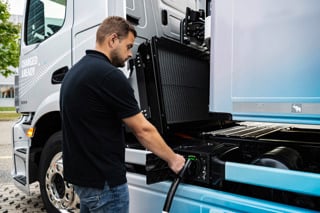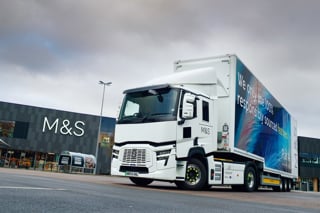YAS began trialling a methanol fuel cell product from Antares last year.
The fuel cell powers all the electrical equipment while the engine is switched off, reducing fuel consumption and CO2 emissions.
According to figures from an Antares case study, the fuel cell design could potentially save £17,000 in fuel costs over three years for a rapid response vehicle.
Antares claims payback on the investment can be achieved in just eight months.
The system consists of three main parts: the auxiliary battery, the fuel cell and a virtual alternator, which ensures the battery is charged more quickly.
The fuel cell means the vehicle can be left secured with the radio systems on but without the engine running.
The system provides data on battery voltage, charging current and on/off-time hours, which can be used to calculate the fuel savings.
As a result of the trial, YAS hopes to introduce the fuel cells into future vehicle designs.
Yorkshire Ambulance Service is building a reputation for innovation and leadership (Keech was awarded the Energy Saving Trust Fleet Hero award for leadership last year).
The aerodynamic body research, Green Environmental Ambulance Network and fuel cell trials put it at the forefront of environmental initiatives nationwide.
In Keech, it was the first to employ an environmental and sustainability manager and last year it appointed its first accident reduction manager.
With ambulance services nationwide paying out significant sums of money each year in damage repairs, this is yet another YAS development which other operations will no doubt be keeping a close watch on.
Six initiatives to green a fleet
- Green Olympics Teams of five to 10 people will compete in this eco-driving programme based on a league table of top performers. “Eco-driving is hard to follow up; this will help to keep the momentum going,” Keech says.
- Aerodynamic ambulances Switching from a box body to an aerodynamic van could reduce fuel consumption by 8-10% – in YAS’s case, this equates to an annual saving of up to £700,000.
- Eliminating idling Ambulances can spend 65% of their time idling. YAS is trialling a methanol fuel cell from Antares which ensures the equipment and computers remain operational even when the engine is switched off. It could save thousands of pounds a year in reduced fuel bills.
- Electric trials YAS started trialling a Nissan Leaf at the start of the year for patient transport services at its Leeds station. With these vehicles typically required to travel up to 120 miles a day, it’s at the very top end of the Leaf’s capabilities. During the six-month trial, YAS will be assessing the possibilities of introducing more cars at suitable sites.
- Workshop lighting Replacing sodium bulbs with compact fluorescents. They cost more but use 40% less energy with payback in less than a year. Adding motion sensors increases the savings.
- The Green Passport Carbon reduction initiatives affecting every part of the business, not just fleet. Includes tips on eco-driving, energy saving, achieving greener offices and homes, greener transport, sustainable food, recycling and reducing water use.

























Karen Cunningham - 28/11/2012 01:29
Awesome article. Sending a link to it to a friend of mine who works in this area, to see what they are doing in London, Ontario with regards to "greening" our ambulances and ambulance stations.